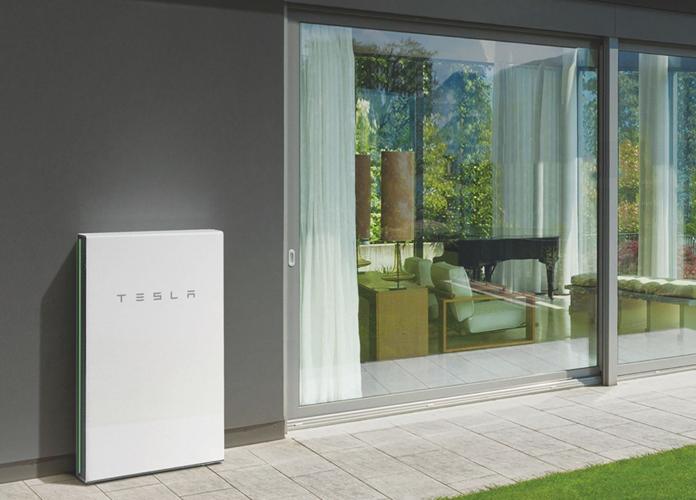Tesla, the high-tech company known for its luxury-class electric cars and for batteries that can power entire homes during outages, is also known for letting people use its technology for free.
Now, for the first time, the company is teaming up with a power-supply utility, Green Mountain Power, to offer Tesla’s newest home batteries to Vermont customers.
The batteries, which the company claims can provide 8 to 10 hours of electricity to a home during a power outage, cost about $7,000 to $9,000 to purchase and install. Green Mountain Power is offering them to 2,000 customers for $15 a month.
All of a sudden, a product from a high-tech company doesn’t have such a high price tag. Mansion dwellers or mobile home owners alike all have an opportunity to have one of the Powerwalls in their houses, as long as they are Green Mountain Power customers. And that means roughly three-quarters of Vermonters, according to utility spokeswoman Kristin Carlson.
“We think this is the energy future,” Carlson said. “Battery storage is a game-changer.”
The Powerwall 2 is a lithium-ion battery that has been on the market since October 2016. It replaces the original model, which was unveiled a year and a half earlier, and has nearly double the storage capacity. Carlson said the average power outage in Vermont lasts about two hours, well within the Powerwall’s range.
Green Mountain did a smaller-scale rollout of the Powerwall 1 last year, and customer feedback has been positive. Carlson said a freak windstorm last month knocked out power to about 15,000 customers, mostly in the Rutland area. Many of the customers with Powerwalls, though, never had the lights go out.
Green Mountain Power is able to subsidize these Powerwalls because the utility is benefiting as well. Customers share access to the batteries with Green Mountain, which will draw power from those batteries during peak electric load times — very hot summer days or cold winter nights, and dinner and television times from around 6 to 9 p.m.
The more people who have the Powerwalls installed, the more the utility can draw from them, instead of paying the higher electric costs during peak demands. The utility stores that shared battery power in its own commercial-sized Teslas.
The company manufactures the Powerpack for commercial use. Both battery systems are sleek and compact, with cool designs and the Tesla logo, but the Powerpack has roughly 15 times the energy-storage capacity of a Powerwall.
By installing 2,000 of the batteries in homes and pairing those with Powerpacks on utility-owned land, Green Mountain estimates seeing the equivalent of 7,500 Vermont homes going off the grid during peak use hours.
“Everything you can do to not have to use energy during that peak time is a reduction, and every reduction helps,” Carlson said.
Green Mountain Power serves 265,000 customers, roughly three-quarters of the state. That includes nearly all of Vermont south of Montpelier. The utility’s reach into Lamoille County and the Northeast Kingdom is scant, though, so other utilities can only wait and watch to see how this battery-sharing arrangement affects the grid.
“We have our eyes peeled for these kind of things, what works and what doesn’t,” said Matt Rutherford of Stowe Electric.
Rutherford said Stowe is always on the lookout for ways to make its electric distribution network more efficient, cheaper and environmentally sound. Small utilities can’t leverage the buy-in population and overhead costs to make such a partnership with a giant like Tesla feasible.
But they all are connected to the same grid, and there’s a possibility that just as Green Mountain Power can lessen the load on that grid by drawing from its customers’ Powerwalls, the entire region could benefit. That’s especially true if the GMP/Tesla partnership leads to larger New England utilities also exploring battery sharing.
Fittingly, it’s like the electric car. Once thought of as ride of choice for moneyed hippies and techies — hot rodders and grease monkeys need not apply — electric cars and hybrids are now making up a significant portion of the American auto market.
















(0) comments
Welcome to the discussion.
Log In
Keep it clean. Please avoid obscene, vulgar, lewd, racist or sexual language.
PLEASE TURN OFF YOUR CAPS LOCK.
Don't threaten. Threats of harming another person will not be tolerated.
Be truthful. Don't knowingly lie about anyone or anything.
Be nice. No racism, sexism or any sort of -ism that is degrading to another person.
Be proactive. Use the "Report" link on each comment to let us know of abusive posts.
Share with us. We'd love to hear eyewitness accounts, the history behind an article.